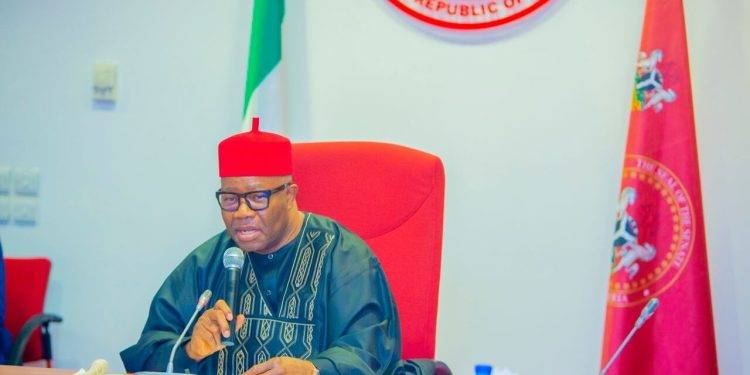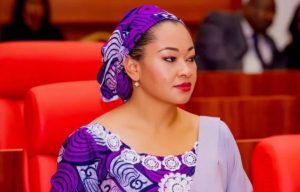Nigerian Senate accepts their own bribe Approves Emergency Rule In Rivers
The Nigerian Senate has officially approved President Bola Tinubu’s controversial request for a state of emergency in Rivers State, following a secretive closed-door session on Thursday. The approval marks a significant escalation in the ongoing political crisis within the oil-rich state, as lawmakers debated the federal takeover of governance in Rivers, alongside the suspension of Governor Siminalayi Fubara.
The Senate’s decision comes just a day after the swearing-in of Vice Admiral Ibok-Ete Ekwe Ibas as the sole administrator of Rivers State. Ibas has swiftly assumed his duties, taking charge of the state’s administration and presiding over a meeting with senior security officers, federal government officials, and top state government personnel at the Rivers State Government House.
The closed-door session was initiated after Senate President Godswill Akpabio read a letter from President Tinubu requesting legislative approval for the state of emergency. According to Senate Leader Opeyemi Bamidele, the session was called under Order 135 of the Senate rules to ensure that sensitive discussions regarding the emergency declaration were held in private.
Senate Leader Bamidele moved the motion for the closed session, stating, “In the first instance, I came under Order 1(b) of our rules, which gives us power to regulate our procedure. The next step, of course, is to move a motion for us to enter a closed session pursuant to Order 135 of our rules.”
The motion was seconded by Senate Minority Leader Abba Moro, allowing senators to deliberate behind closed doors without public scrutiny.
With both the House of Representatives and the Senate now in agreement, President Tinubu’s takeover of Rivers State has been effectively solidified.
Following the Senate’s approval, Vice Admiral Ibok-Ete Ekwe Ibas wasted no time in asserting federal control over Rivers State. Upon his arrival at the Rivers State Government House on Thursday morning, he immediately convened a meeting with key figures, including security officers and government officials, to ensure the smooth transition of power under the emergency rule.
Ibas’ appointment and swift actions signal the full-scale federal takeover of governance in Rivers, with all key decisions and responsibilities now under federal jurisdiction. His first order of business appears to have been engaging with state security forces to maintain law and order in the face of escalating tensions.
There have been reports suggesting that Senate President Akpabio, who played a significant role in facilitating the Senate’s approval, may have received financial backing from controversial sources to secure the emergency declaration vote. Sources close to the development have alleged that Nyesom Wike, the Minister of the Federal Capital Territory, provided funds to Akpabio to rally support among senators for the state of emergency.
SaharaReporters has learned from reliable sources that Wike allegedly provided over $3 million to Akpabio, with a portion of the funds purportedly used to persuade senators during a private Iftar gathering. During this session, Akpabio reportedly distributed dollars to senators based on their seniority. However, some senators, including former governors Seriake Dickson and Aminu Tambuwal, reportedly refrained from attending the Iftar gathering.
Despite these allegations, Senate President Akpabio and other key figures have denied any improper conduct or financial influence in the approval process. The secrecy surrounding the Senate’s closed-door session has only fueled speculations regarding the nature of the deal-making behind the scenes.
The approval of emergency rule in Rivers State has sparked a wave of criticism from opposition figures and civil society organizations. Critics argue that the declaration is an overreach of federal power and could undermine democratic principles by allowing the federal government to override the governance of a state through what they describe as “undemocratic” means.
Legal experts have raised questions regarding the constitutional legitimacy of the state of emergency, with some arguing that it may be an illegal move to consolidate power at the federal level. The emergency rule effectively suspends the elected state government, including Governor Fubara, who has faced mounting pressure and allegations from both political rivals and the federal government.
With the Senate’s approval now in hand, the emergency rule in Rivers State is set to be fully implemented. The next steps in the process include the continued involvement of Vice Admiral Ibas, who will likely oversee the day-to-day governance of the state in the absence of elected officials.
As the situation unfolds, it remains to be seen how Rivers State residents will respond to the federal takeover. Concerns have already been raised about the impact on local governance, with fears that the absence of elected officials could lead to disruptions in the delivery of public services and further fuel political unrest.
The Senate’s approval of the state of emergency in Rivers State has marked a new chapter in the ongoing political turmoil in Nigeria’s oil-rich region. The move represents a significant victory for President Tinubu, but it also raises serious questions about the future of federal-state relations in Nigeria.
With both legislative chambers backing the emergency declaration, the federal government now has full control over Rivers State. However, the controversy surrounding the decision, including allegations of financial influence and behind-the-scenes maneuvering, is sure to remain a point of contention as the political crisis continues to unfold.
As Vice Admiral Ibas takes charge, the coming weeks and months will reveal the true impact of the federal takeover, with ongoing debates about the balance of power between the federal and state governments likely to continue.





